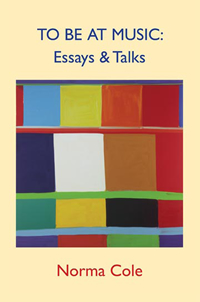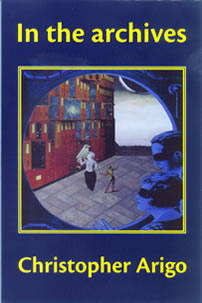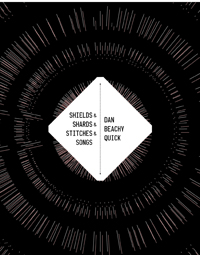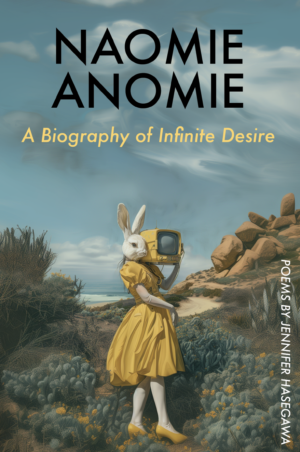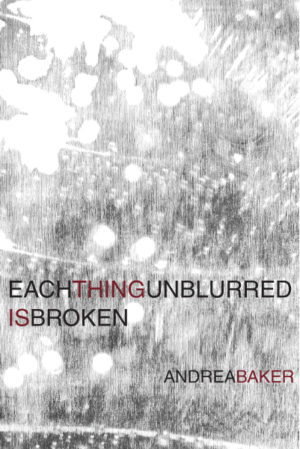Description
To Be At Music is the first collection of essays by Norma Cole, who is one of our most respected poets writing in the innovative tradition, as well as an esteemed translator and visual artist. These 21 prose pieces reflect her inimitable ability to make the critical essay an art form that engages both the sensual and the cerebral, the aural and the visual, the analytic and the intuitive nature of her readers. Many of these are essays or talks written in response to invitations to discuss the works of writers and artists such as Hans Christian Andersen, Robin Blaser, Edmond Jabès, Mina Loy, Lorine Niedecker, George Oppen, Stanley Whitney, and Christa Wolf. Each offers Cole’s unique appreciation of what it means to read, to interact with a work of art, to write, or to translate, and to perceive each activity as a way to attune oneself anew to the world that is both within and beyond our expected methods of understanding.
Norma Cole says that “a poem is a made place, a deedless deed that stakes out or constellates ambiguity without laying claim to it, without attempting to master or contain it.” She has here assembled into a book her long dialogue with many voices, some her own, some the voices of those she loves. These essays are never attempts to master, but they are subtle questioning of various works in various languages, and are impassioned engagements at specific moments in time; many were written as celebrations of writers such as Lorine Niedecker and George Oppen. But the liveliness of mind, constant and thrilling throughout, is the liveliness of Norma Cole herself. Like the person herself, this book is a fabulous companion.
Bin Ramke, author of Theory of Mind: New and Selected Poems and editor of Denver Quarterly
To read Norma Cole’s wondrous essays is indeed to be at music; her investigations subtle and expansive give us brave and lovely glints of what a writing subjectivity might ideally be. Here is silence’s substance, time’s abrasion, our linguistic possessivity and opening, an engagement with language and —stunningly— with the structure of the essay itself. Cole is as at home with Xenophanes as she is with Dante; her citational presences are flares of thought by which she builds the imaginary community some would banish from the Republic: where poets live, eat, remember, name. Hers is a search past borders rather in defense of them; she knows lucid and ludic are the same word and to be ludic —in or at play— is real resistance. Painting, visuality, translation, prosody, pictures, words, vertigo, time: the reader immerses in these essais, and marvels and is renewed.
Erin Moure, author of My Beloved Wager and Little Theatres
In one of her essays—really an insufficient word for these experimental thought-montages—Norma Cole describes translation as “a record of the encounter.” What we get in To Be At Music is the record of Cole’s profound encounters with the works and lives of Oppen, Blanchot, H.D., Niedecker, Jabès, Blaser; the paintings of Stanley Whitney and Marjorie Welish; the hard facts of contemporary history. What marks all these pieces is a marvelous openness. Instead of delivering neatly packaged conclusions, Cole invites us to participate in her thought process, to become active collaborators in the making of meaning.
Raphael Rubinstein, author of Polychrome Profusion: Selected Art Criticism 1990-2002 and art critic for Art in America
About the Author
Excerpt
Norma Cole is a poet, painter and translator. Her recent poetry publications include The Vulgar Tongue, Desire & Its Double and Spinoza in Her Youth, Scout, a text/image work in CD-ROM format. Current translation work includes Danielle Collobert’s Journals, Anne Portugal’s Nude and Crosscut Universe: Writing on Writing from France. She created 2004-6 Collective Memory, an installation, performance, and publication for “Poetry and its Arts: Bay Area Interactions 1954-2004,” California Historical Society, San Francisco, CA. Cole has received a Wallace Alexander Gerbode Foundation Award, Gertrude Stein Awards, the Robert D. Richardson Non-Fiction Award, as well as awards from the Fund for Poetry. A Canadian by birth, Cole migrated via France to San Francisco where she has lived for over twenty years.
Start Singing
is a place
it’s in my silence
“leaving order as a way of starting over it’s impossible to repeat” (Mars)
16.vii.94 This, the last line of “What Others Had Told Me,” written more than three years ago, wants, today, to be read “impossible to retreat.” Scrawled in my notebook on an airplane SFO-Paris, this entry is dated, like everything in the notebooks. But, looking at it today, I realize that I had actually written 16.vii.74. So much for keeping track of the numbers of years.
To list possibilities and dismiss them is a way of elaborating or describing a “negative poetics,” the invisible woman walks through the rain, everything is seen through her, through rain and through her. Would you be so kind as to look at my eyes, as to look at the points of view behind false opposites. (At this point, I could have made another different shape, but did not realize it.) A form of greeting sent out from a century. From captivity. From exile. Raise your glass in wordless toast. Ashbery, from “The System”: “The facts of history…the oral kind that goes on in you….” Invention or lamentation, “separation is the first fact,” from My Bird Book. From Michael Palmer’s Sun, “you are in // me as history I fix / and crystal to it.” Ashbery, “The System”: “…the progress toward infinity had crystallized in them….” In all specificity, are words the image of thought? asked the gizmologist. Blast and dazzle.
Robert Walser, “There’s something missing when I don’t hear music, and when I do, then there’s really something missing.”
From My Bird Book:
…measures loosely assembled…
…thought claims scaffold in the fact…
…A model of vigor sets up a measure…
…In this sung desire images rub up against each other….
Nate Mackey, Talisman interview: “You know, in language we inherit the voices of the dead.”
This is where theory tries to catch up with poetry.
“I feel cornflakes how they / are grown in a digital state.”
(Nostalgia) All sounds are off, although experience isn’t everything. The current obsession with guessing about “the millennium” reminds me of The Millennium Falcon, Star Wars, my son’s childhood, his fantasy: “when the nuclear disaster occurs, we’ll get into our spaceship and blast off the earth.”
“When they were scared, I’d start singing.” (Bosnian refugee, in Chris Marker’s Prime Time in the Camps, Camp Rosni, 1993)
Working, I am always in a present moment which consists of and insists upon looking forwards and backwards at the same time. It is a vigilance, an attention, a careful listening, an effort, serious play. In this way, we are the future of poetry, the ones who are writing, those who are reading. How we attend to each other. The ongoing conversation, the small presses, the magazines, on paper or online. In the face of…
I’m interested in what we can know, or what we can ask, and how poetry is a form of this asking and knowing, this trying to remember or trying to foresee, or to grasp what is ungraspable, and play with it in a territory of risk, and of permission. Is it true that you can only long for something in the past, something gone? Every day, for each day, there are entries in this book (lifts her notebook), possibly made up of many separate notations, thoughts in relation to what I’m reading, the news, conversations, ongoing considerations, dialogue with an idea, a “concern,” one of “my” concerns, a question I am keeping in mind or that is keeping me in mind. Each day begins with its written date.
In this way, it is additive, quantitative; and, since we are changed by our thoughts (thought as experience) and by the things we make and witness as they look back at us, witness us, we are apprehended by them and we are changed. The writing changes. And so what accumulates in this additive way changes qualitatively, irreversibly. And so I wonder, but very occasionally, what I’ll experience when I write the date of the new century. In answer to your question is it a concern of mine, not particularly, no. There are so many days and nights between now and then. You see how literally I take everything? How my imagination is literal? This is one of my concerns. As is memory, and history in the word, and what happens, what is made when the words are placed by or near each other. As is memory and the representation of it, what it gives (gives way to), and how it shapes thought. How could language exist without memory? How does memory exist without language? “In quella parte del libro della mia memoria…” Dante, La vita nuova (“In that part of the book of my memory…” D.G. Rossetti tr.)
Insistent concerns, from Mace Hill Remap, “possibility,” “resistance,” “song,” “time,” “to eliminate security,” “stripping discourse,” “discrete and continuous,” “will,” “memory of probability,” “truth is a widow,” “Imaginations law hits frames,” “spaces gather,” “that tongue be time,” “reckoning in a work of form ideas of time.” From Metamorphopsia, “spell by binding,” “Love replaces time,” “place of missing parts,” “say things / and hear the sound.” From Moira, “more towards a multiple exposure,” “but sometimes the emotional body,” “the sense of time in a form,” “the materiality of this music.”
I’ll conclude these preliminary remarks with words from Susan Gervitz’s Prosthesis: “in the gentle and long the impossible…”
SFSU Review Benefit
30 November, 1994
Published in SFSU Review
Volume, No.2 1995
__________________________________________
* Philo of Alexandria, “Treatise on the Confusion of Languages”

